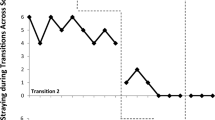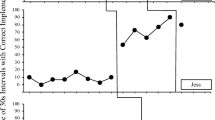Abstract
Two studies are presented which examine the use of differential reinforcement of incompatible behavior (DRI) procedures in treating classroom management problems of developmentally disabled children. Each study utilizes reinforcement delivered on adjusting schedules. In Study 1 hallucinatory verbalizing was eliminated by reinforcing a child for remaining quiet during specified intervals. In Study 2 a child’s out-of-seat behavior was suppressed by reinforcing appropriate sitting. In each case the effects of DRI were immediate and produced stable suppression but these positive results were restricted to settings in which treatment was applied. Procedures used to maintain the effects of intervention are discussed.
Similar content being viewed by others
Reference Notes
CONNIS, R. T., RUSCH, F. R., SOWERS, J., & CUMMINGS, L. T. Programming maintenance through sequential withdrawal of social contingencies. Unpublished manuscript, University of Washington, 1979.
LUISELLI, J. K., COLOZZI, G. A., & O’TOOLE, K. M. Programming response maintenance in a differential reinforcement program with a behaviorally disordered child: An experimental analysis. Manuscript submitted for publication, 1979.
References
BAER, D. M., WOLF, M. M., & RISLEY, T. R. 1968. Some current dimensions of applied behavior analysis. Journal of Applied Behavior Analysis, 1, 01–97.
DEITZ, S. M. 1977. An analysis of programming Drl schedules in educational settings. Behaviour Research and Therapy, 15, 103–111.
DEITZ, S. M., REPP, A. C., & DEITZ, D. E. D. 1976. Reducing inappropriate classroom behaviour of retarded students through three procedures of differential reinforcement. Journal of Mental Deficiency Research, 20, 155–170.
FOREHAND, R., & BAUMEISTER, A. A. 1976. Deceleration of aberrant behavior among retarded individuals. In M. Hersen, R. M. Eisler, & P. M. Miller (Eds.), Progress in behavior modification (Vol. 2). New York: Academic Press.
HAWKINS, R. P., & DOTSON, V. A. 1975. Reliability scores that delude: An Alice in Wonderland trip through the misleading characteristics of interobserver agreement scores in interval recording. In E. Ramp & G. Semb (Eds.), Behavior analysis: Areas of research and application. New Jersey: Prentice-Hall.
HAYNES, S. N., & GEDDY, P. 1973. Suppression of psychotic hallucinations through timeout. Behavior Therapy, 4, 123–127.
JONES, R. T., & KAZDIN, A. E. 1975. Programming response maintenance after withdrawing token reinforcement. Behavior Therapy, 6, 153–164.
KAZDIN, A. E. 1975. Behavior modification in applied settings. Glenview, Illinois: Dorsey Press.
MARHOLIN II, D., & SIEGEL, L. J. 1978. Beyond the law of effect: Programming for the maintenance of behavioral change. In D. Marholin II (Ed.), Child behavior therapy. New York: Gardner Press, Inc.
MARHOLIN II, D., SIEGEL, L. J., & PHILLIPS, D. 1976. Treatment and transfer: A search for empirical procedures. In M. Hersen, R. M. Eisler, & P. M. Miller (Eds.), Progress in behavior modification (Vol. 3). New York: Academic Press.
ZEILER, M. D. 1970. Other behavior: Consequences of reinforcing not responding. Journal of Psychology, 74, 149–159.
Author information
Authors and Affiliations
Additional information
Study 1 was supported, in part, by a grant from Title VI B, Education of the Handicapped Act, Project #77-010-71 B/N.
Rights and permissions
About this article
Cite this article
Luiselli, J.K., Colozzi, G.A., Helfen, C.S. et al. Differential Reinforcement of Incompatible Behavior (DRI) in Treating Classroom Management Problems of Developmentally Disabled Children. Psychol Rec 30, 261–270 (1980). https://doi.org/10.1007/BF03394676
Published:
Issue Date:
DOI: https://doi.org/10.1007/BF03394676




